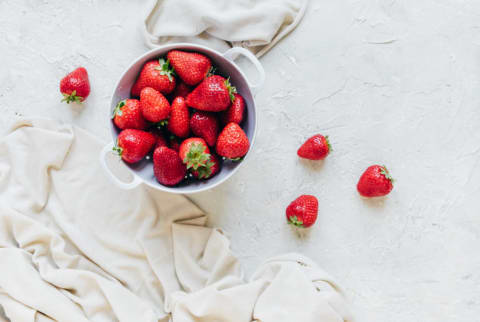Advertisement
How To Wash Strawberries: The 3 Simple Methods You Should Try


There are no two things that go more perfectly together than fresh fruit and the summertime. When the temperature is rising and the heat is tamping down your appetite, somehow a bowl of fruit or a cool and satisfying smoothie always manages to save the day. But one thing that does not mix so well with the sunshine is unwashed produce.
We get it, you don't necessarily want to go through the effort of scrubbing down your berries before you throw them on top of your overnight oats or yogurt, but knowing how to properly wash your strawberries may actually protect your health, removing all the grime or even pesticides that reside on the skin.
And hear me out: We've all seen someone swapping out the strawberries at the grocery store for better ones in a different container—just think about what may be on their hands.
We got to the bottom of how exactly you should be washing your strawberries, why it's important, and anything else you may need to know when it comes to enjoying your fruit.
How to clean your strawberries:
A quick scrub
Contrary to popular belief, washing your fruit doesn't have to be a huge production. In fact, while it requires a little more effort than simply running them under the water, there's no reason to go overboard with washing your strawberries. "For strawberries in particular, use cold running water and a gentle rubbing motion right before eating them," recommends registered dietitian nutritionist Marisa Moore, MBA, RDN, L.D.
A gentle soak & dry
If you want to give your fruit a little extra bath, you can also place your berries in a colander and shower them in cold water before scrubbing them lightly. Making sure to blot your berries after rinsing them will also ensure that any leftovers you don't immediately eat will store well and not spoil overnight in the fridge. Ideally, though, you'd wash your berries directly before eating them.
A salt bath
Soaking your berries in salt water will also draw out any bugs or larvae that may have made a home in the crevices of your berry (gross, we know) but may slightly change the taste. For this method, add a teaspoon of salt to a bowl of warm water and let your berries soak for five to 10 minutes to make sure you're eating the freshest bug-free fruit possible. Of course, you'll want to rinse them again after, in order to remove the salty residue.
Why it's important to wash your strawberries
Unfortunately, strawberries top the Environmental Working Group (EWG) Dirty Dozen list of produce most likely to be coated with pesticides—even if the packaging claims they have been prewashed. In fact, USDA testing revealed that nearly all strawberries house at least one variation of pesticide.
Washing your strawberries at home can help to remove some of this residue, as well as any dirt that may be leftover from growth and harvest. "Strawberries have a rough surface due to their seeds, so it is important to wash them (and lightly scrub them) with running water," notes Ginger Hultin, M.S., RDN.
Common strawberry-washing mistakes
There is such a thing as going overboard when you're washing your fruit, and as noted above, a gentle scrub with some running water is enough to do the job on your strawberries. "You don't need anything special to wash your fruit or berries. Soap, detergent, bleach, or even commercial produce wash isn't recommended or necessary," explains Hultin.
However, you may be under-cleaning your strawberries as well. "If you're just wiping with a paper towel or giving a brief rinse, that's not enough," warns Frances Largeman-Roth, RDN. There should be some mild scrubbing, too.
Our favorite strawberry-based recipes
Strawberries are one of the most versatile fruits: from topping your overnight oats to acting as a star ingredient of a bright salad, the options are nearly endless. If you need a little inspiration, here are our favorite mbg recipes to make the most of your berries:
The takeaway
Taking those extra seconds to wash your strawberries before you dig in will not only remove dirt from the surface but can also cleanse your fruit of pesticides.
You don't have to go overboard to make sure your fruit is getting clean, a good rinse and a gentle scrub are really all it takes to prepare your strawberries for all the delicious dishes they can inhabit.
